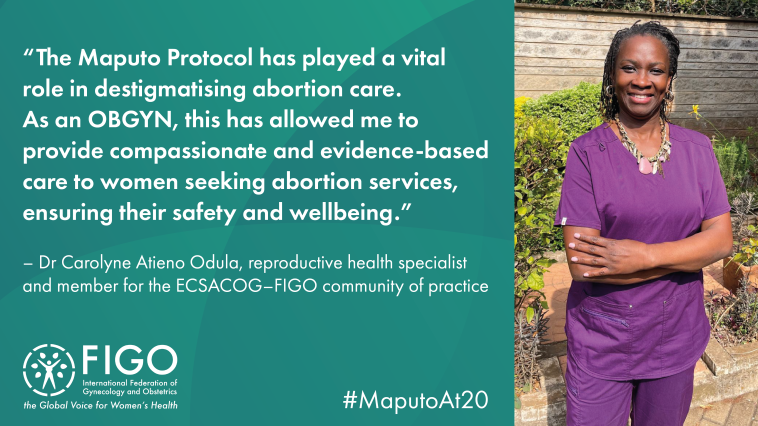Dr Carolyne Odula on the Maputo Protocol and challenging socio-cultural norms in Kenya
On 11 July 2023, FIGO is celebrating the 20th anniversary of the Maputo Protocol by sharing reflections from across Africa on how the Maputo Protocol has impacted the practice of obstetrics and gynaecology. Dr Carolyne Odula, an ostetrician-gynaecologist from Kenya, discusses the importance of a rights-based approach to women's health and the need for continued advocacy for the implementation of the Maputo Protocol.

Dr Carolyne Atieno Odula is a Reproductive Health Specialist with over 20 years’ experience in her field. She is a Senior Medical Specialist based at the University of Nairobi Health Services, Obstetrics and Gynaecology Department. She is also a member of The East, Central and Southern Africa College of Obstetrics and Gynaecology (ECSACOG) – FIGO Community of Practice.
What have been the key achievements of the Maputo Protocol?
One of the significant achievements of the Maputo Protocol is its contribution to shaping thinking on sexual and reproductive health and rights (SRHR). By explicitly recognising and affirming women's rights to make decisions about their own bodies, including reproductive choices, it has helped to shift the narrative around SRHR. This shift has been crucial in advancing the rights of women and girls, enabling them to access comprehensive reproductive health care services without discrimination or coercion.
The protocol has played a vital role in destigmatising abortion care. It recognises the right of women to access safe and legal abortion services in cases of rape, incest, or when the pregnancy poses a threat to the woman’s or girl's life and/or mental and/or physical health. This acknowledgment has helped challenge societal taboos, facilitating open discussions about abortion as a legitimate aspect of reproductive healthcare. As an OBGYN, this has allowed me to provide compassionate and evidence-based care to women seeking abortion services, reducing the stigma and ensuring their safety and wellbeing.
Were you or your OBYN society involved in the discussions regarding the Maputo Protocol development?
The Kenya Obstetrical and Gynaecological (KOGS) engaged in the discussions regarding the development of the Maputo Protocol and its inclusion into Kenyan law. We provided recommendations on issues related to reproductive health, including access to contraception, safe abortion services, maternal health and gender-based violence prevention and response.
We also played a lead role in advocating for its integration into Kenyan law, through advocacy campaigns in collaboration with civil society organisations and working with policymakers and legislators to raise awareness. However, this continues to be an uphill task.
Are there still challenges in implementing the Maputo Protocol for your country context?
In Kenya, the protocol was adopted into our national laws and policies with exceptions. We strongly believe that this related to various political, legal and policy gaps as well as cultural considerations – specifically on the topics of abortion, comprehensive sexuality education and gender equality.
Our key challenges include limited awareness and understanding, inadequate resources and infrastructure allocated to reproductive health care services, lack of access to essential medicines and technologies and the shortage of skilled providers for full implementation.
Socio-cultural norms and religious barriers may have influenced attitudes towards women’s SRHR. Gender-based violence remains a significant challenge as women’s access to quality healthcare services is compromised. Marginalised populations, women with disabilities and minority groups face additional barriers in accessing services and knowing their rights. Monitoring and accountability is crucial as well, to hold duty bearers to their commitments.
How can the challenges to the implementation of the Maputo Protocol be addressed?
One clear challenge is that Kenya still has a reservation on article 14 (2) c of the Maputo Protocol, which authorises medical abortion in cases of sexual assault, rape, incest, and where the continued pregnancy endangers the health of the mother or the life of the mother or the foetus.
Addressing this challenge requires a comprehensive multi-faceted approach involving various stakeholders and collaboration between governments, civil society organisations, health care providers and international partners. It needs sustained advocacy, capacity building, resource mobilisation and creating an enabling legal and policy environment.
What role can health care professionals, particularly OBGYNs, play in advocating for the full implementation of the Maputo Protocol and addressing the barriers that still exist in realising women/girls’ sexual and reproductive rights?
To celebrate International Women’s Day in March 2023, KOGS joined OBGYN national societies from East, Central and Southern Africa to reaffirm their commitment to strengthen access to safe abortion care through the launch of the Livingstone Safe Abortion Care Charter, a regional advocacy opportunity.
The national societies pledged to leverage their clinical expertise and resources to promote safe abortion, a low hanging fruit in the prevention of maternal deaths and disabilities, and to include it as an essential health care package. Evidence-based information is essential to ensuring quality and non-discriminatory care, and to promoting policy and legal reform. Collaborating to develop position statements, guidelines and advocacy and communication strategies to address barriers for the full realisation of SRHR rights is key.
How has the Maputo Protocol influenced the training and education of health care professionals in the field of obstetrics and gynaecology, and what improvements or changes would you recommend to further strengthen reproductive healthcare services?
There is a growing recognition for the need to integrate SRHR into training and education in curricula or dedicated modules for providers, and to address issues such as the continuum of safe abortion care, gender-based violence, informed consent, reproductive autonomy and the rights of marginalised populations. We have seen increased efforts to incorporate comprehensive sexuality education and respectful and inclusive care as core components of health care training.
We need more interdisciplinary learning and collaborative training to foster teamwork and improve service delivery within health care facilities. We must provide quality care with an emphasis on ethical principles of autonomy, beneficence, non-maleficence and justice in the context of SRHR to make sure we uphold women’s fundamental rights.